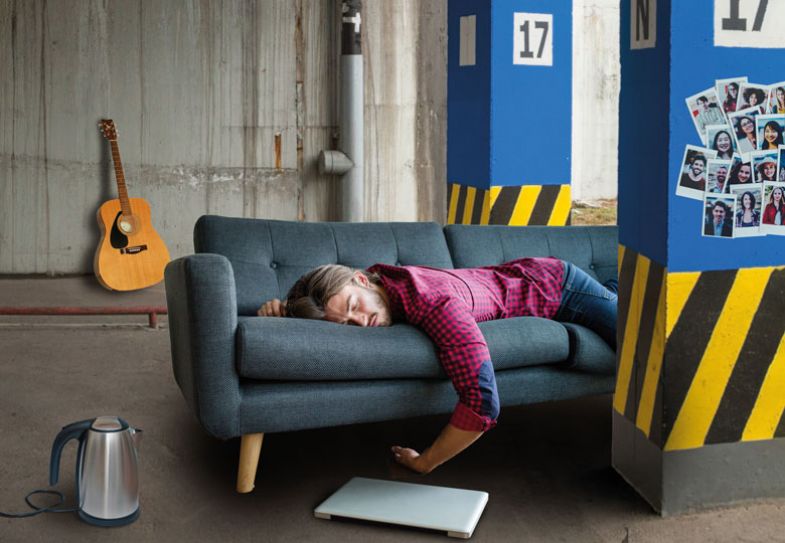When it comes to attracting students, “universities naturally consider the sort of courses they offer, the style of teaching, what they put in the curriculum. Those factors loom very large to them because that’s what’s important to them,” says Mark Corver, co-founder of the consultancy dataHE and, formerly, director of analysis and research at UK admissions service Ucas.
However, for many students, a higher priority is the quality and location of their accommodation.
“It determines what their daily life is like. It determines their social interactions, and if it’s not right for some reason…it means that their university experience is not good,” says Corver. “The suitability of student accommodation is a large hidden part of the student experience. It’s really important to get it right – and the most important part of getting it right is simply to have enough of the right accommodation in the right place.”
Recent UK news coverage has been full of reports of students being forced to live miles away from their university, leading housing charity Unipol to declare a student housing “crisis”. Stories include University of Bristol students being housed in Newport, Manchester students in Liverpool and York students in Hull, 20, 34 and 37 miles away respectively.
To a large extent, what Corver says encapsulates the problem. Student housing may have sometimes been a peripheral issue for universities, but it isn’t for students. And while the solution to students’ problems might seem simple, in reality it is far from it.
“When students are sold the ‘university experience’, that package includes living on campus with other students,” says Celina Sousa Pereira, well-being and liberation officer at the University of Manchester Students’ Union. “However, when a student is forced to live far away from campus, to put it simply, the package they receive is not the one they purchased.”
Rinna Väre is president of the Students’ Representative Council at the University of Glasgow, which, last September, was criticised for telling students who hadn’t found accommodation in the city not to register for their courses. She says commuting students face long journeys on expensive public transport and can be “trapped on campus” between classes. A lack of suitable housing has caused a number of students to either suspend or withdraw from their studies, she adds.
Being stuck so far from campus also impacts students’ social lives, says Isobel Russell, student living officer at the University of Bristol. “This is having a huge impact on their mental health; coming out of a pandemic, many continue to be isolated and alone in their cold rooms, only having the time and money to study and work.”
Even the “impossible” task of looking for housing takes a huge toll on students’ mental health, as well as their grades, Russell adds, while the housing shortage and correspondingly “insane” rental prices are making the university more elitist.
“The students with more money are able to live near campus and the centre of town, so have university, work and shops on their doorstep. Others who are less well off are forced to find cheaper rooms, often more than an hour’s bus ride away,” Russell says.
Frustration over a lack of options and rising prices has prompted some students to turn to alternative arrangements, with housing cooperatives emerging in many cities. These cheaper options, often with longer lease options, allow students to stay in one place for a much longer period of time, saving them time and money, says Lisa Hartley, operations manager of Student Co-op Homes.

“When you’re living somewhere that’s more affordable and that you know you can stay for a few years, there is less stress,” she says, adding that “unsustainable housing situations” cause “a lot” of students to drop out of university.
The current housing squeeze is exacerbating the “awful experiences” that international students in particular often have of private renting, says Bristol’s Russell. Those experiences are partly a result of the fact that international students are advised not to sign an accommodation contract until their visa process is completed, explains Anne Marie Graham, chief executive of the UK Council for International Student Affairs.
Hence, “from the outset, they are at a disadvantage as most available accommodation has already been secured by the time they complete this process”.
While recent interventions from ministers suggest that the government is ambivalent about the value of international students, the latter – alongside domestic 18-year-olds – are expected to drive continuing growth in student numbers over the next decade, according to Corver of dataHE – which is owned by Times Higher Education.
Even now, the demand is such that as much as 75 per cent of all purpose-built student accommodation (PBSA) at some of the UK’s top universities was already rented for 2023-24 even before the Ucas application deadline on 25 January, according to data from Stripe Property Group – and early-January figures from Unite, the UK’s leading student housing provider, told a similar story.
Graham Galbraith, vice-chancellor of the University of Portsmouth, says rising demand is occurring at the same time as a slowdown in the growth of PBSA due to the pandemic and other economic headwinds, such as the higher cost of borrowing and construction materials. This is making the housing issue appear “significantly more profound”, he says.
Moreover, planning the right accommodation in the right place is “enormously difficult”, according to Corver – not least because PBSA providers have to try to predict not only student demand for particular universities but also those universities’ desire to service that demand.
“A big PBSA provider a few years ago may have correctly predicted that more 18-year-olds will want to go university and go to higher-tariff universities, but what’s harder to predict is that the vice-chancellors of these universities might not want them,” he says.
Moreover, as the era of cheap finance seems to be coming to a close, the costs for universities of getting assumptions about student demand wrong are becoming greater, potentially making them warier about borrowing to finance expansion. Hence, “however bad things are now for student accommodation, it’s quite likely they will be worse in the future because the investments aren’t being made now which would result in new residences being opened in the late 2020s”, Corver says.
Meanwhile, the private rental sector – described by Corver as the “traditional buffer of last resort” – is diminishing on account of more onerous regulation and higher mortgage rates.
“There’s lots going on” in the private rental market, agrees Martin Blakey, chief executive of Unipol, adding up to “a perfect storm”. For instance, government planning changes designed to appease local people who feel crowded out by students have placed a “corset” on the growth of on-street housing. And the incentive to buy to let has, besides, been dampened by the “rough time” landlords have had recently – with two years of students asking for their money back as a result of the pandemic and a third year when many students leased very early and secured cheap gas bills before the cost-of-living crisis kicked in.
Landlords of accommodation in more desirable locations and cities increasingly prefer to let to young professionals or to offer short-term lets via sites such as Airbnb, Blakey adds.

Landlords have seen costs rise sharply over the past few years, agrees James Wood, policy manager of the National Residential Landlords Association (NRLA), which means they have to “raise rents or sell up”. And he predicts the tide of those selling up will only swell in the near future due to a number of factors, including concerns over future regulations and reforms to mortgage interest tax relief.
Wood also says landlords have “justifiable concerns” over the upcoming renters’ reform bill, which proposes that all student tenancies, with the exception of those in PBSA, should be open-ended so that tenants can’t be evicted against their will. The NRLA says the proposals will cause a further significant reduction in available accommodation.
A University of Glasgow spokesperson says contraction in the private rental sector is already the most significant cause of Glasgow’s student housing shortage: “Even if the university student population doesn’t grow, or indeed shrinks, a small fluctuation in the private rental market could easily cause a major housing shortage as over 80 per cent of the student population is not housed in university accommodation.”
The UK is far from alone in experiencing student housing problems, with similar dilemmas being faced across many parts of Europe and beyond.
Ireland’s housing scarcity recently forced the government to step in with construction subsidies. French students have been forced to decamp to the countryside, and last summer young people were told not to travel to certain universities in the Netherlands without first securing accommodation.
A recent report found that students have also been priced out of some major Australian cities, while rampant inflation and insufficient safety nets have left many having to choose between eating or paying the rent.
Torie Brown, executive director of the Student Accommodation Council at the Property Council of Australia, says that the cultural norm for Australian students to study in their home city restricted the growth of the private rental market and led universities – the most prestigious of which are based in inner-city locations, where land is a scarce resource – to view on-campus accommodation as a marginal priority. But the rise of Australia as a destination for international students has changed all that. Demand has risen again with the return of tens of thousands of Chinese students following Beijing’s sudden abolition of Covid restrictions, but supply has been diminished by sell-offs during the pandemic – albeit accounting for only a small proportion of the total, according to Phil Honeywood, chief executive of the International Education Association of Australia (IEAA).
One difficulty in ensuring adequate provision, he says, is that different nationalities prefer different accommodation options: “Students from the subcontinent, both for financial and cultural reasons, prefer to live in shared housing in the middle to outer suburbs, where private rental homes are less expensive. In contrast, most Chinese students, who come from single-child families, seem to both prefer and be financially able to buy or rent inner-city apartments.”
An affordable housing problem is also affecting some regions in the US. Carl Whitaker, a real estate economist at RealPage, which specialises in property management software and data analytics, says that only about half the number of new student beds are being delivered today than they were in 2013-14 because a lot of universities have already been built out to their maximum. And while there is a “solid equilibrium” between supply and demand overall, there are particular challenges at some hotspots – most notably the urban centres of California and New York, where it is “almost impossible to deliver student housing”, he says.
Graduate-student workers at the University of California recently took industrial action to demand higher wages amid rocketing housing costs in most of the cities where the university is based – partly as a result of the university’s gentrifying effect on their communities. Meanwhile, the university’s flagship Berkeley campus was nearly forced to turn away a third of its 9,000-strong freshman class last autumn because of a legal victory by city residents angered by the overcrowding and housing pressure they said had resulted from Berkeley’s admission of 14,000 more students since 2005 while adding only 1,600 beds to student accommodation. Berkeley’s chancellor, Carol Christ, thanked lawmakers for overturning the legal setback and promised to build below-market-rate housing to reduce the “crisis” of availability.
Housing pressures are not equally felt by all UK universities either. Matthew Armstrong, director of student accommodation at commercial property firm CBRE UK, says that relevant factors include the underlying state of the residential market in each city, the types of university in question and a university’s exposure to different student markets. Investor interest rises and falls depending on how much supply already exists in a particular area, so each university can go through its own cycle, he adds.
According for Unipol’s Blakey, universities have tended to see accommodation guarantees as part of their promotional offer for first-year students, but increasingly leave students to find their own housing in subsequent years, passing on the financial risks of provision to the private sector. The latest figures from the Higher Education Statistics Agency appear to bear this out, showing that the proportion of first-year students living outside provider-maintained properties rose from 64 per cent in 2014-15 to 74 per cent in 2021-22.
In the UK, housing shortages were exacerbated when the scrapping of A-level exams during the pandemic, in favour of teacher-predicted grades, led to grade inflation. This meant that higher-tariff institutions in particular found themselves having to accommodate many more first-years than they had bargained for. And while some universities may be able to buy in enough rooms for first-years during the current crisis, that only makes it even harder for second- and third-years to find somewhere to live.
“It’s very much like a flood,” Blakey says. “You can put the sandbags at the front of your house but you need to be careful the water is not coming in at the back. A real housing shortage affects everyone.”
But he thinks the stories of universities having to accommodate their students in distant towns, or even turn them away entirely, is bringing home to vice-chancellors that housing issues have the potential to blow all their financial predictions out of the water if they rebound on recruitment and retention.
“I think people are beginning to realise it’s going to limit their expansion,” he says.
Carl Lee, who wrote his PhD on the student housing market in Sheffield, thinks expansion plans should not even be permitted unless universities can show they have given serious consideration to where the extra students will live – instead of assuming that they will simply be absorbed into the private rental sector.
“There’s a real argument to be made that if universities want to expand numbers, they should show how they can be accommodated,” he says.
Corver takes a similar view. “Having the right accommodation in place is almost a prerequisite for the growth plan of universities,” he says. “There is no point being an ambitious v-c, saying you’re going to double UK and international recruitment over the next five years, and then finding there is nowhere for them to live.” To that end, he thinks there is a case for universities to “take on more of the risks” of providing extra housing themselves.
Galbraith agrees a lack of PBSAs could be a barrier to future long-term growth, so “it will be up to universities to work smarter to…provide new opportunities for growth and expansion. For example, recruiting more local students could mitigate the need to provide additional housing, as could greater use of remote-learning activities.”
He says every vice-chancellor in the country will be taking the issue seriously, even if some, like himself, run universities in areas with less pressure on their housing. But the limiting factor on taking action will not so much be a sense of urgency as economic wherewithal, he thinks.
“Some universities are in stronger financial positions, enabling them to respond with a greater range of responses. Those universities with financial constraints will not have funds to invest in this issue and will not have the capacity to borrow to fund any solutions,” he says.
The University of Bristol’s accommodation problems are at least a decade old. As long ago as 2014, dozens of first-years were forced to share rooms and sleep in bunk beds as the institution’s intake of UK and European Union students grew by 38 per cent in three years – even ahead of the removal of England’s numbers cap in 2015-16. But, post-pandemic, the university has begun to rein in expansion, accepting nearly 20 per cent fewer students in 2022 than it did in 2021.
Evelyn Welch, Bristol’s current vice-chancellor, says her institution’s accommodation guarantee increasingly determines the number of offers that can be made and the number of students who can be admitted.
“Last year we were able to meet this commitment thanks to careful planning, but it did mean we had to say no to some very qualified students who narrowly missed their grades,” she says.
Thousands more PBSA rooms will be delivered to ease pressure on existing accommodation in residential areas, she adds – while, further out from the city centre, 900 PBSA rooms will become available from September for students at the University of the West of England, with plans for a further 2,750 over the next few years, ultimately allowing the institution to offer all its first-years a place in campus halls.
But even large investments in accommodation do not necessarily stave off problems. York’s resort to housing students in Hull, for instance, came despite its development of more than 3,300 new on-campus rooms since 2009, according to its vice-chancellor, Charlie Jeffery.
For Blakey, part of the solution is for universities to share their data and collaborate on accommodation planning with their local authorities – and with other local higher education institutions, even when they are competing for students. And with two universities and two further education colleges in a city of a little over 200,000 people, Jeffery agrees that York would benefit from cooperation on town planning.
Portsmouth’s Galbraith says effective partnerships between local authorities and providers will permit better responses to changing demands, greater consideration of local needs and, crucially, shared risk. He also calls for more ambition in the type of housing provided, including cheaper dormitory-style rooms, or hotel-style accommodation for commuter students available for two or three nights at a time.
However, he says the biggest challenge for English universities is the volatility of the government’s approach to international students, which has swung from ambitious target-setting under Boris Johnson to suggestions of restricting recruitment to top-ranked universities under Rishi Sunak. “The responsibility [for planning accommodation] is placed on universities, yet universities have only limited local control on developments,” he says. “Certainty is important around government policy for universities as provision of housing is a long-term investment.”
Corver adds that PBSA investment is also discouraged by the feeling that the current government is not very keen on large numbers of young Britons going to university either, with suggestions of minimum entry tariffs and caps on courses considered to have poor graduate outcomes.
But unless something is done, affordability of accommodation is only going to become a bigger and bigger issue, says Lee, the Sheffield PhD graduate. The problem is that the fall in value of home fees by nearly 30 per cent since they were tripled in 2012, no longer covering the cost of course provision, means that universities’ hands are tied. Indeed, recent figures showed that rent prices of some university-managed student halls at Russell Group institutions have increased by more than £1,000 a year since before the pandemic. The “unpopular” solution would be for the government to permit a rise in tuition fees, Lee says.
Ultimately, Corver would like the UK sector to look at incorporating three years of accommodation into their offers to students, in a single “package deal”. But Galbraith says it is not financially viable for most universities to take full control of accommodation as that would divert funding from teaching and research. In addition to the falling value of the tuition fee, the below-inflation increase in student maintenance loans has caused “real affordability issues for students, which affects the attractiveness for investors in student housing”.
The Department for Education notes that it has put an extra £15 million into hardship funds for students this year, a 5.7 per cent increase on the original allocation. But York’s Jeffery describes the 2.8 per cent uplift in maintenance loans as “woefully inadequate”, while Bristol’s Welch sees the accommodation issue as being of a piece with the wider funding pressures facing England’s higher education sector. The current funding model, in relation to both education and research, “isn’t working for anyone”, she concludes.
Unless more UK students become more like their Australian cousins, then, and study at universities close to home, it seems likely that rents, commutes and stress levels will all continue to rise.
Register to continue
Why register?
- Registration is free and only takes a moment
- Once registered, you can read 3 articles a month
- Sign up for our newsletter
Subscribe
Or subscribe for unlimited access to:
- Unlimited access to news, views, insights & reviews
- Digital editions
- Digital access to THE’s university and college rankings analysis
Already registered or a current subscriber?








